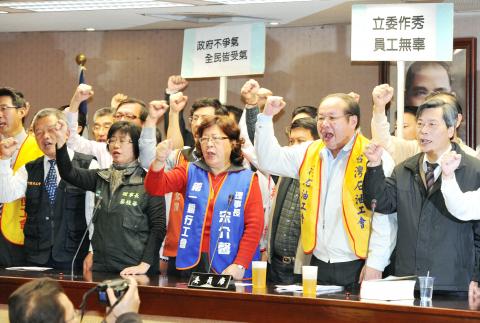|
Premier defends Shih
in bonus row
OUT OF TOUCH: Lawmakers were demanding that the
economics minister be replaced for proposing hefty bonuses for workers at
loss-making state-owned firms
By Shih Hsiu-chuan / Staff reporter

Labor union representatives from
more than 20 state-owned enterprises yesterday raise their fists at a press
conference in the legislature in Taipei to protest against cuts in performance
bonuses.
Photo: Chien Jung-fong, Taipei Times
Premier Sean Chen yesterday appealed to
lawmakers to give Minister of Economic Affairs Shih Yen-hsiang (施顏祥) more time
to carry out his policies.
“He has plans in mind and he has started to put them into action. [We need to]
give him time to implement his policies,” Chen said in response to calls from
lawmakers across party lines for Shih to step down after disputes broke out over
bonuses for workers at state-owned firms.
Lawmakers on Monday set a bonus cap of 1.2 months’ salary for employees of
state-owned firms — slashing the Cabinet’s proposed bonus of up to 2.6 months’
salary — adding that bonuses would only be distributed if the company finished
the year with a surplus.
The cut applies only to bonuses based on the company’s performance, which are
distributed during the Lunar New Year. State-owned firms also give out job
performance-based bonuses.
Compared with the Cabinet’s proposal, the bonus reduction could save the nation
NT$28 billion (US$964.7 million).
The move by lawmakers came after Chen on Friday approved a proposal to award
workers at five state-owned firms administered by the Ministry of Economic
Affairs company bonuses equivalent to 4.6 months of wages, despite a public
outcry.
Late last month, Shih decided that workers at the state firms would be awarded
the following company bonuses: CPC Corp, Taiwan (CPC, 台灣中油), 2.6 months of
salary; Aerospace Industrial Development Corp (AIDC, 漢翔航空), 1.88 months; Taiwan
Power Co (Taipower, 台電), 1.65 months; Taiwan Water Corp (TWC, 台灣自來水), 1.46
months; and Taiwan Sugar Corp (Taisugar, 台糖), 1.31 months.
The size of the bonus for CPC workers was increased to 4.6 months after Chen
decided that employees of CPC, AIDC, TWC and Taisugar would also receive a
job-performance bonus equivalent to two months’ salary and 1.8 months’ salary
for Taipower workers.
Ministry data showed that in 2011, CPC posted a deficit of NT$32.4 billion,
Taipower a loss of NT$43.3 billion and TWC a deficit of NT$367 million. AIDC and
Taisugar both reported profits that year, of NT$1.1 billion and NT$5.5 billion
respectively.
At a cross-party negotiation meeting on Monday to discuss proposed budget cuts
for this year, lawmakers decided that workers at loss-making state-owned firms
would not receive a company bonus, and those at profit-making ones would get a
bonus equivalent to no more than 1.2 months of salary.
Lawmakers also demanded that Shih be replaced, saying he had been indifferent to
the public’s suffering with his decision to give out hefty bonuses.
In response to the bonus cut, Chen said that he respected the lawmakers’
decision pursuant to the legislature’s authority.
However, he expressed concern that such a policy would make it hard for
state-owned firms to recruit or retain talent.
Chen added that workers at state-owned enterprises usually receive less pay than
their counterparts in the private sector.
Upset at the bonus cap, representatives from about 20 state-owned enterprises’
unions lodged a protest in the legislature yesterday afternoon.
The group said that without setting a rational standard for deciding bonuses,
the cap on performance-based bonuses would not only affect employee morale, but
also the overall performance of the companies.
Separately yesterday, President Ma Ying-jeou (馬英九) expressed support for pension
reform in state-run companies.
This came following the legislature’s decision to slash company bonuses, adding
that the government was determined to push reforms.
“Some state-run businesses are in a monopolistic market and some face tough
competition. Their situation might differ, but we support reform for all. The
Executive Yuan also supports such reforms,” said Ma, who doubles as the Chinese
Nationalist Party (KMT) chairman.
He added that state-run firms should adopt the same principles as private firms
and offer bonuses only when the companies made a profit.
The Democratic Progressive Party (DPP) said it supported the
institutionalization of a bonus mechanism for state-owned enterprises because it
serves the country’s interests and is fair.
DPP spokesperson Lin Chun-hsien (林俊憲) added that trade union members of
state-owned enterprises are entitled to protest against the policy, but they are
encouraged to “think about social justice and the nation’s current financial
status” before staging a protest.
Additional reporting by Mo Yan-chih, Chris Wang and staff writer
|
![]()
![]()
![]()